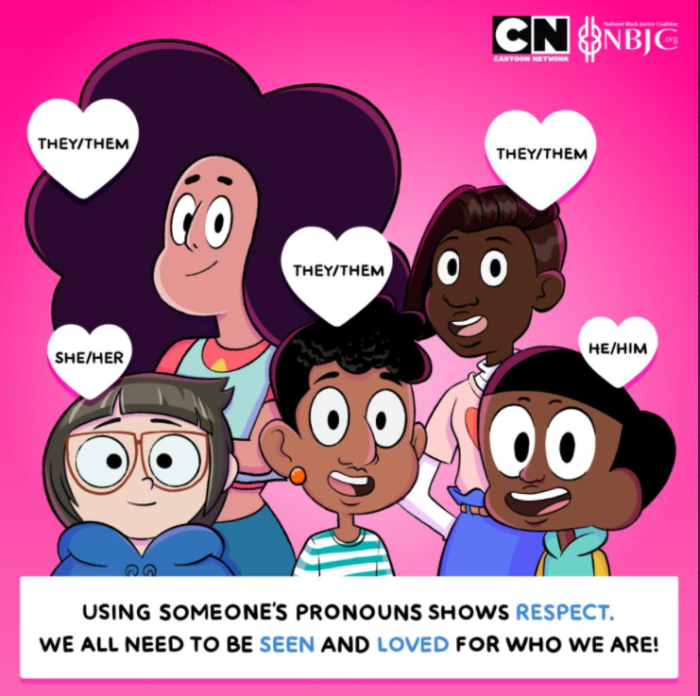Cartoon Network promotes multiple gender identities

A television network well-known for family-friendly programming has collaborated with a liberal interest group to create a series of digital comic strips “normalizing gender pronouns” other than “she” and “he.”
The Cartoon Network took to Twitter Monday, unveiling four comic strips created in conjunction with the National Black Justice Coalition. “Here’s to not only normalizing gender pronouns, but respecting them, too. Whether you use he/she/them or something else, we acknowledge and LOVE you!” read the caption accompanying the comic strips.
Here's to not only normalizing gender pronouns, but respecting them, too ???? Whether you use he/she/them or something else, we acknowledge and LOVE you! Toolkit ???? https://t.co/ZbhthybrdC
— Cartoon Network (@cartoonnetwork) December 14, 2020
????: Steeeeevn/Instagram#Pronouns#YYAAC#NBJCOnTheMove#LetsGetFree#CartoonNetworkpic.twitter.com/koceQue1aF
The text at the bottom of the first comic strip asserts, “We can’t tell someone’s gender just by looking at them, and we shouldn’t assume we know. There are many gender identities beyond ‘girl’ or ‘boy’: some people don’t identify as any gender!”
One of the three characters in the first comic strip remarks, “Gender pronouns describe a person’s gender identity.” “Examples of pronouns are she/her, they/them, and ze/zir!” said another. The third character explains, “A lot of people are learning about gender. If you’re comfortable, you can share your own pronouns!”
The second comic strip features one of the characters from the first comic strip, who identifies herself as Chloe, chatting with two people who refused to identify with either gender and instead use the pronouns “they/them.” After the first person expresses a preference for the pronouns “they/them,” the other person who uses the same pronouns feels relieved, claiming, “I feel seen.”
The first person, Kam, tells the others, “Thanks, y’all! When people use my pronouns, I feel respected, safe, and included.”
“Yes! Your pronouns reflect…you! I’ve learned something new today!” says Chloe, who previously “thought there was only she/her and he/him.”
The third comic strip features the other two characters from the first comic strip, with one of the characters introducing Alex, one of the nonbinary people from the second comic strip, to his friend Stevonnie, who also uses “they/them” pronouns. “Wow! It’s a relief to know people who affirm who I am,” Alex says after the introductions conclude.
The fourth and final comic strip features pictures of all five of the characters accompanied by their preferred pronouns. The text at the bottom of the screen summarizes the message of the comic strips: “Using someone’s pronouns shows respect. We all need to be seen and loved for who we are!”
The tweet featuring the comic strips included a link to a “Gender Justice Toolkit,” titled “Words matter,” that was compiled by the National Black Justice Coalition. In the toolkit, “biological sex” is listed as one of several “terms to avoid” because it is “often seen as a binary, which excludes intersex individuals.” Additionally, the toolkit singles out the idea of “Gender Identity Disorder” or “Gender Dysphoria” as “offensive because it labels them ‘disordered.’”
The toolkit also advises against the use of the word “female,” contending that “while not inherently derogatory, the term has been used to dehumanize Black women and girls.” Reflecting comments recently made by Sen. Mazie Hirono, D-Hawaii, during Amy Coney Barrett’s Supreme Court confirmation hearings, the toolkit alleges that the term “sexual preference” has a “negative connotation” because it “implies sexuality is an individual’s choice.”
Encouraging readers to facilitate a “gender justice journey,” the toolkit unveils a “pledge to be an informed advocate,” which includes a call to support the Equality Act. The Equality Act is packaged as a bill that would enshrine legal protections for the LGBT community into federal civil rights law but critics have expressed concern that it would threaten religious liberty and put biological females at a disadvantage in women’s sports by enabling biological males who identify as females to compete against them.
This is not the first time that Cartoon Network has decided to use its platform to express support for the LGBT movement. In June 2019, Cartoon Network tweeted out a picture featuring characters from its popular cartoon series “The Powerpuff Girls” standing in front of a rainbow accompanied by the words “Happy Pride!” The tweet was sent out to commemorate the annual LGBT pride month.





























